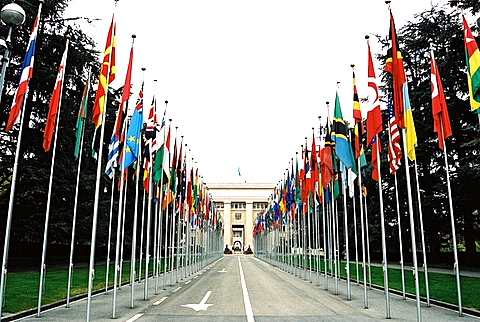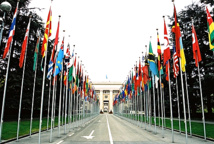The committee also passed resolutions condemning Iran and North Korea and calling on Myanmar to release political prisoners and ease the suffering of Rohingya Muslims.
The Syria resolution -- passed with 123 nations in favor, 13 against and 46 abstaining -- laid most of the blame for the huge death toll on the Syrian government.
The resolution strongly condemned "the continued widespread and systematic gross violations of human rights and fundamental freedoms and all violations of international humanitarian law by the Syrian authorities and the government-affiliated shabbiha militias."
In a strong condemnation of an August 21 chemical weapons attack near Damascus in which hundreds died, the resolution came close to blaming President Bashar al-Assad's government.
A UN inquiry has confirmed that chemical weapons were used but has not blamed any side. The Assad government has accused opposition rebels of staging the attack.
The resolution said a UN inquiry "provides clear evidence that surface-to-surface rockets were fired on August 21 from government-held territory into opposition areas, using professionally made munitions containing sarin."
Saudi Arabia's UN envoy Abdullah al-Mouallimi and his Syrian counterpart Bashar Jaafari came to diplomatic blows.
Mouallimi said the resolution aimed to highlight "the suffering imposed on people in Syria such as mass killing, genocide, starvation, torture, oppression, kidnapping, terrorism and abduction."
Addressing Jaafari, he added: "I would like to invite him, with affection and respect, to be embarrassed by covering up the crimes perpetrated by his authorities."
Saudi Arabia is a major backer of the Syrian opposition and an infuriated Jaafari hit back, calling the resolution "shameful."
"The Saudi regime is the last one that can talk about human rights given its black record in the domain," Jaafari said.
Support for the resolution was down from 2012 when 135 countries voted for, 12 were against and 36 abstained.
A Canadian-drafted resolution on Iran welcomed pledges made by President Hassan Rouhani on eliminating discrimination against women and on freedom of expression.
But the resolution, passed by 83 votes, with 36 against and 62 abstentions, expressed "deep concern" over torture and other abuses, the widespread use of the death penalty, particularly for minors, and amputations and flogging as a punishment.
It also condemned the "systematic targeting and harassment of human rights defenders." It said that gender inequality and violence against women remains "pervasive".
Iran's UN ambassador Mohamed Khazaee said the accusations were "devoid of facts" and the resolution had ignored major progress in Iran.
The annual condemnation of abuses in North Korea -- including torture, the use of the death penalty and its many labor camps -- was passed by consensus without even a vote.
North Korea rejected the text as "politically motivated."
A resolution on Myanmar welcomed reforms started by the post-junta government but called on it to keep to a promise to free all political prisoners by the end of the year.
It said the authorities should also give nationality to the estimated 800,000 stateless Rohingya Muslims in the country who have been the target of inter-religious attacks.
All of the resolutions will now go before the full 193 state General Assembly for a vote later this year.
---------------------------------------------------------------------------------------------
The Syria resolution -- passed with 123 nations in favor, 13 against and 46 abstaining -- laid most of the blame for the huge death toll on the Syrian government.
The resolution strongly condemned "the continued widespread and systematic gross violations of human rights and fundamental freedoms and all violations of international humanitarian law by the Syrian authorities and the government-affiliated shabbiha militias."
In a strong condemnation of an August 21 chemical weapons attack near Damascus in which hundreds died, the resolution came close to blaming President Bashar al-Assad's government.
A UN inquiry has confirmed that chemical weapons were used but has not blamed any side. The Assad government has accused opposition rebels of staging the attack.
The resolution said a UN inquiry "provides clear evidence that surface-to-surface rockets were fired on August 21 from government-held territory into opposition areas, using professionally made munitions containing sarin."
Saudi Arabia's UN envoy Abdullah al-Mouallimi and his Syrian counterpart Bashar Jaafari came to diplomatic blows.
Mouallimi said the resolution aimed to highlight "the suffering imposed on people in Syria such as mass killing, genocide, starvation, torture, oppression, kidnapping, terrorism and abduction."
Addressing Jaafari, he added: "I would like to invite him, with affection and respect, to be embarrassed by covering up the crimes perpetrated by his authorities."
Saudi Arabia is a major backer of the Syrian opposition and an infuriated Jaafari hit back, calling the resolution "shameful."
"The Saudi regime is the last one that can talk about human rights given its black record in the domain," Jaafari said.
Support for the resolution was down from 2012 when 135 countries voted for, 12 were against and 36 abstained.
A Canadian-drafted resolution on Iran welcomed pledges made by President Hassan Rouhani on eliminating discrimination against women and on freedom of expression.
But the resolution, passed by 83 votes, with 36 against and 62 abstentions, expressed "deep concern" over torture and other abuses, the widespread use of the death penalty, particularly for minors, and amputations and flogging as a punishment.
It also condemned the "systematic targeting and harassment of human rights defenders." It said that gender inequality and violence against women remains "pervasive".
Iran's UN ambassador Mohamed Khazaee said the accusations were "devoid of facts" and the resolution had ignored major progress in Iran.
The annual condemnation of abuses in North Korea -- including torture, the use of the death penalty and its many labor camps -- was passed by consensus without even a vote.
North Korea rejected the text as "politically motivated."
A resolution on Myanmar welcomed reforms started by the post-junta government but called on it to keep to a promise to free all political prisoners by the end of the year.
It said the authorities should also give nationality to the estimated 800,000 stateless Rohingya Muslims in the country who have been the target of inter-religious attacks.
All of the resolutions will now go before the full 193 state General Assembly for a vote later this year.
---------------------------------------------------------------------------------------------









 Home
Home Politics
Politics











